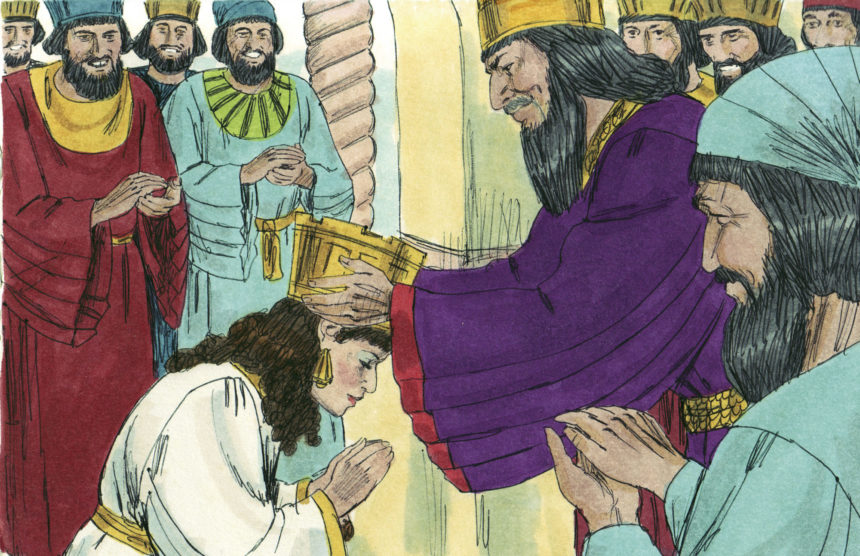Bible Study
Esther Chapter 1 and 2 (NLT Version)
The book of Esther makes no mention of God and given all the available evidence, Esther was not a devout or practicing Jew. In fact, she deliberately hid her identity as a Jew (Esther 2:10). She ignored Jewish dietary laws (Esther 2:9). She is part of a harem, the sexual nature of which is quite clear. Esther must go to the king at night and “please” him and having successfully pleased the gentile king, Esther is made his queen. Intermarriage between gentiles and Jews is a direct violation of Jewish law (Deut. 7: 3-4) and one of the reasons why the Jews were sent into exile in the first place. Esther and her uncle, Mordecai, have so completely disappeared into this foreign and pagan culture that neither even seems to use their Jewish names. The name Mordecai is derivative of the Babylonian God Marduk and Esther (whose real name is Hadassah) is a Persian name meaning “star.” In contrast to Daniel, Ezra, and Nehemiah; Esther chose compromise and fitting in over standing apart from the pagan culture that surrounded her.
In this we understand Esther. Sometimes it’s just easier to “go with the flow.” We might know that the Bible supports things like tithing, Sabbath keeping, and sexual purity; however, the world around us certainly does not. It is hard to continually fight against the flow of a culture that does not know or understand our values. Moreover, failing to compromise and live according to the values and systems of the world around us can be detrimental. We might suppose that the Bible wants us to be honest and kind or to demonstrate grace and love; however, doing those things in a culture which does not value them can be more trouble than it is worth. Does God really want us to be ostracized? Being labeled as a “goody two shoes” is probably not the best way to witness and certainly never helped anyone get ahead in life. We understand Esther’s compromises, because truthfully most of us have also compromised.
The bad news is that God takes compromise seriously. Joshua laid it out for the Israelites when they entered the Promised Land – “choose for yourselves this day whom you will serve” (Joshua 24:15). They could either follow false gods and live like the neighboring people or live as separate people who followed the laws that Moses had given them in the wilderness. Jesus warned his disciples against compromise even if it means personal ease or worldly gain, saying “If anyone would come after me, he must deny himself and take up his cross and follow me” (Mark 8: 34). Paul wrote to the early Christians in Rome and urged them to live in a way counter to the culture that surrounded them: Do not conform any longer to the pattern of this world, but be transformed by the renewing of your mind. Then you will be able to test and approve what God’s will is–his good, pleasing and perfect will (Romans 12:2 NIV). Even Peter described followers as strangers and aliens (1 Peter 2:11). Compromise dilutes our witness and imperils our souls. Believers cannot be said to truly “believe” if they continue to act counter to those beliefs.
The good news is that despite Esther’s compromise, God still chose to use her. God might not be mentioned explicitly in the book of Esther, but make no mistake even as the characters seem to act in ways that ignore God’s authority and existence, God is still operating. God is still in control and God worked powerfully through the circumstances in Esther’s life. Even if we have compromised in ways big and small, God is not done with us. God is not giving up on us. God still wants to use us and to see his will accomplished not just in our personal lives but in his world. According to the Theology of Work Bible Commentary “Past hypocrisy is no excuse for failing to heed what God needs from you now. Prior misuse of your God-given abilities is no reason to believe you cannot employ them for God’s good purposes today. Esther is the model for all of us who have fallen short of the glory of God. You cannot say, ‘If you knew how many ethical shortcomings I made to get here — I can’t be of any use to God now.’”[1]
Questions:
- In what ways do Christians compromise and attempt to hide our true identities in Christ?
- Why do Christians compromise?
- Do our compromises hurt or help the gospel? Why?
[1] the Theology of Work Project, Inc. Theology of Work Bible Commentary, 2014 https://www.biblegateway.com/resources/theology-of-work/esther-and-work

